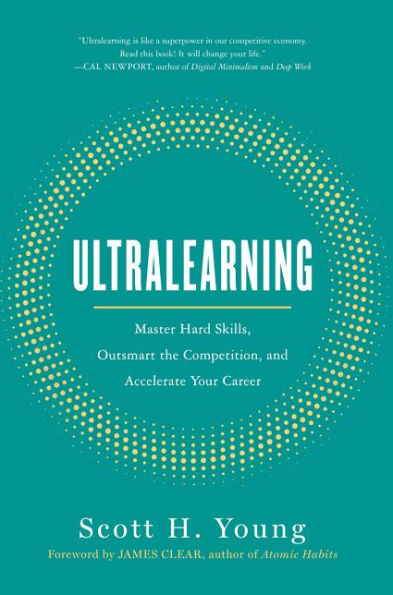
Ultralearning: Accelerate Your Career, Master Hard Skills and Outsmart the Competition
Summary
Review
TL;DR
This book isn't about using the Cornell notes method and how you can use mnemonics to remember anything (although it is covered a bit but not even encouraged), it goes so much deeper. Scott, the Author, lays out a framework and approaches to learning that you must customize for your chosen subject to master, your timeframe, and strengths. James Clears quote in the forward explains the soul of the book, "Passive learning creates knowledge, Active Practice creates skill."
The Dunning–Kruger effect is a real thing. That is what hit me when I listened to this book.
A little background for where I am coming from. I have taken the popular "Learning How To Learn" Coursera course, as well as taken a studying course from my college. I have a lot of books on thinking, the brain, and similar topics. I even listened to one of the premiere books on memory "Make It Stick".
None of those books prepared me for the wealth of knowledge within this book.
Maybe you are like me, and thought that spaced repetition was the end-all, be all to learning (in fact it is more for retention than learning itself). When you crack open this book, you soon find out there is a thing called Metalearning. I was like, I know what that is, that is learning about how to learn, right? Wrong! Metalearning is learning about how to best acquire a specific skill or knowledge in a specific domain. This concept blew my mind. I had insights like this happen over and over again when I was listening to this book. It hit me again when he talked about when and where you should use Ultralearning, and what the different learning approaches are. I felt infantile and like I had just stepped out of the darkness and into the light of my own lack of understanding, but it was too good to stop, I had to know more.
He goes on to lay out 9 principles that you can use as the foundation of an Ultralearning project, things such as directness (actually doing crap), drill (Attacking your weak points), retention, and intuition to name a few. Each one is explained very well and has concrete examples in the way of stories to help you understand the concept further.
Scott lays out that you don't need a huge 3 month swath of time to do an Ultralearning project, but you can tailor it to your needs and demands on your time. I really liked this part because it plays well with the balance of having a family, full time job, part time jobs, and hobbies. He also explains that you can use the techniques within the book during your normal learning routines, be they at work, or in school.
This is not the kind of book you read once and put down, it is the kind you come back to to reference techniques as you need to. I know I will be rereading sections of this book and taking notes now that I have listened to it.
Cons (Or What to Improve)
It would be nice to have a reference that would boil all of this information down in an easily consumable form. In fact, I plan on making one myself and will post the link here when it is done.
It would be nice to have coaching that would guide you through the process of becoming an Ultralearner, a good worksheet could also help with that.
The subtitle to this book is also a little bit of a misnomer because there wasn't enough application in the book to "Outsmarting Competition, or "Career" but I think it can help you do those things.